- Home
- Shirley McKay
Martinmas
Martinmas Read online
Other titles in the Hew Cullan Mystery series
Hue & Cry
Fate & Fortune
Time & Tide
Friend & Foe
Queen & Country
Other titles in the Calendar of Crime series
Candlemas
Whitsunday
Lammas
Martinmas
Yule
The complete collection of short stories:
1588: A Calendar of Crime
A Novel in Five Books
This eBook edition published in Great Britain in 2016 by
Polygon, an imprint of Birlinn Ltd
West Newington House
10 Newington Road
Edinburgh
EH9 1QS
www.polygonbooks.co.uk
eISBN 9780857909152
Copyright © Shirley McKay, 2016
The right of Shirley McKay to be identified as the author of this work has been asserted by her in accordance with the Copyright, Designs and Patents Act, 1988.
All rights reserved. No part of this publication may be reproduced, stored, or transmitted in any form, or by any means electronic, mechanical or photocopying, recording or otherwise, without the express written permission of the publisher.
British Library Cataloguing-in-Publication Data
Martinmas
‘And when the cold of death is come and body voyd remanes
Each where my haunting spirit shall pursue thee to thy paines’
Contents
1. Crowe
2. Snell
3. Balfour
4. Crabbe
Postscript
Notes
Glossary
Also by Series
1.
Crowe
‘Melancholike persons . . . imagine many things’
Martinmas term blew in with a storm. The students of St Salvator’s, returning to St Andrews on the first day of October, were buffeted by winds that blasted from the sea. At night, they lay awake to the rattle of the rain. They found it hard to settle after the excitements of the summer months. The vacation had been dominated by the threat from Spain. In August, the Armada had been sighted in the Forth, and many of the students had resolved to fight, some prepared to die, for their way of life. Before they had a chance to put their courage to the test, the ships were blown off course and broken on the rocks by the raft of storms that battered at the coast. The wreckage left unspent a furious pent-up force. The students did not bow down meekly to their books but brought with them an energy that the restless elements did little to disperse.
The master William Cranston, who taught the entrant year, complained to his colleagues that his class comprised ‘the most fidging, kittil pack of bairns’ that he had ever come across. ‘It is not,’ he said, ‘that they want for brains. But they cannot settle to the smallest task.’
‘This fretful disposition does not augur well,’ said the principal Giles Locke. ‘There is mischief brewing. Can you smell it, Hew?’ He appealed to Hew Cullan, as professor in the law. Since Hew lived out of town, and since he did not lecture to the first year class, he could be relied upon to remain detached, his appraisals cool and practical.
‘There is something growing, certainly,’ Hew said. ‘A fustiness and mould, where the roof slates leak. As to the smell, the college reeks of kale, and of adolescence, as it always did. Worse now, I think, because the students are confined. This is the third week that the weather has prevented them from going to the links, or to practise at the butts. They have had no exercise.’
‘That is very true.’ Giles proposed a remedy: a tournament of golf, ‘to be held, come what may, on Wednesday next week. It will give their passions purpose and a vent. Golf is a game that stands up well to wind. I do not propose an argument for archery.’
Hew said, ’God forbid.’
On Wednesday, October 26, the day broke dull but dry. The students from St Salvator’s were taken to the sands, to play a round of golf. St Leonard’s too turned out. The hot and fettered spirits, recklessly released, broke out into a football match, with a hundred students grappling for the ball, some of them with golf clubs flailing in their hands, their ardour barely dampened by the showers of spray thrown up in their faces by the fractious sea. At the close of play, when the regents gathered in their drenched and bloodied ranks, the students judged the ‘golf’ to be a great success. Their masters were dismayed to find them more enflamed than when they had set out.
One young boy hung back, reluctant, from the rest. The student Thomas Crowe had not enjoyed the game. He did not like St Salvator’s, the structures it imposed upon his daily life, or the other students in his class.
The students who returned hungry from the links jostled past him to the place where supper was set out. Thomas did not join them, for he did not like it there. A man had been strung up, or perhaps had hanged himself, in the dinner hall. An older boy had told them that when they first arrived. And Death had come to supper once or twice before. Professor Bartie Groat had perished in the plague. His sniffing could be heard in the upper cloister, when a bitter wind was blowing from the north. This was sworn as true, by students who came after Bartie Groat was dead. He had been professor of mathematics. His Euclid had been burnt to ashes in the kiln, for fear it carried in it traces of the peste.
Thomas Crowe knew death. He knew that it had a way of insinuating itself deep inside the stone, the fabric of a place. Once it had a grip, it did not let go. It left behind it grief. Thomas understood the depth to which it plunged. There was sickness in his family that afflicted the bairns in his father’s house. His mother was bereft. Her children were born dead, or too malformed to live. Some said it was caused by a witch’s curse. His father sought advice, and whatever the answer, it had seemed to work, for his mother had delivered two healthy sons, Thomas and his brother, older by a year. His mother’s strength had failed, and she was never well enough to bear a bairn again. His father loved his boys, and taught them both at home. When Thomas was twelve, and Patrick thirteen, he engaged a tutor to prepare them to matriculate at the university. Then Thomas had awoken, restless, in the night, to find Patrick dead beside him in the truckle bed where they had slept together almost all their lives. They were close as twins. But Patrick, lately, had begun to change. His slender limbs had thickened and his voice grew hoarse, a fluff of down appearing on his cheek and chin. He had begun to grow into a man, leaving his brother still a bairn behind him. Thomas had awoken to the weight of Patrick’s arm, carelessly flung out on to his side of the bed. He had thrown it off, and felt it stiff and cold. Death had come in the night, to take Patrick as he slept.
Patrick had not been unwell. His long, ranging body did not show a mark. The broad hand that dropped where Thomas had pushed it lay open, the palm facing up to the sky. The fingers that curled there did not flex again.
Patrick’s body lay beside him in the bed. But there was nothing left of Patrick in it. Death had stripped it bare.
His mother was not well enough to understand the news. But his father had uttered a terrible cry. ‘I have lost God,’ he had said.
‘No, no, no, no, no,’ the minister who came to bury Patrick said. ‘God has not forsaken you. He puts you to the test. Why should he test one who might not be saved? Ye mauna gie up hope.’
Patrick was not in the corpse that was put in the ground. He came to see his brother three times after that. The first and the second time it was in a dream, the hairs on his arm, the laughter in his voice as clearly defined as they had been in life, and nothing like the shadow he had left in death. The third was in the garden of their father’s house, where he came to Thomas in a copse of trees. He was insubstantial then, but Patrick all the same. His presence was a comfort, and Thomas spoke t
o him. But when he told his tutor Patrick had appeared – his father at that time was distracted and remote – the tutor had explained it was the devil’s work. It was not Patrick’s spirit that had come to him, for the souls of the dead did not roam the earth. It was the devil that had taken Patrick’s shape; that was a thing that the devil liked to do, and an easy trick for him, to lead a man astray. The tutor had made Thomas pray, hard on his knees till he was stiff and sore, and the devil went away. The tutor said, ‘Give thanks, that God has seen it fit to put you to this test,’ a sour note to his voice, as though he envied him. Thomas was confused. ‘I thought it was the devil?’ he had said.
Thomas turned thirteen. He had grown to the age that Patrick had been, and beyond it. Yet he had not thrown off the trappings of a child. He was small and bairnlike, and his skin was smooth. His voice, when he sang the psalms, was as faint and feeble as a boy of nine’s, rising sweet and tremulous. Only now had it begun to creak and crack, as though it were the devil mocking at God’s word. His tutor said he should not fight what was a natural thing. But Thomas did not like that he had no control of it.
His father had enrolled him at St Andrews University. At fourteen, he was ready to depart. His brother, had he lived, would be there before him, in his second year. Now Thomas was advised that he must go alone. His tutor had instilled in him the Latin he would need. He had instilled in him, besides, a fear of the devil and a deep mistrust in God, which Thomas had been wise enough to hide. He spent much of his time praying on his knees, with his tutor by his side, to force the devil out. The tutor had been doubtful that they would succeed.
His father did not ken of their struggles with the devil. He had retreated to a torment of his own. But he emerged from it long enough to tell his son that he would be going to the College of St Salvator. ‘They call it the Auld College. You will like it there. You will have the company of bairns your ain age. Young men, I mean.’
Thomas had telt him that he did not want to go. ‘Let me stay with you.’ He had had no company but the tutor’s since his brother’s death, and he wanted none. His father had turned, so that Thomas could not see the expression on his face. ‘It is for the best.’
The tutor was dismayed at the father’s choice. He had taken his own degree at St Leonard’s, and after at St Mary’s had studied for the Kirk. It was no fault of his own that he found no living there, and had to tutor boys. (It was not, Thomas thought, for the want of prayer). St Leonard’s was a fount of religion, and a solid rock of the Reformation. The college of St Salvator was a place apart. The principal was kent to have some Catholic sympathies. He held certain views. Discipline was lax, and heresies advanced.
The father had stood fast. He had been a student at St Salvator’s himself, and he had no reason to suspect its present principal. Giles Locke was a doctor of physick. He had saved lives.
‘Lives, aye,’ the tutor had retorted. Though it was plain he hinted ‘at the cost of souls’, the father would not move. So this was the place where Thomas was sent.
‘You will have to try especially hard,’ the tutor said to him. ‘See it as a test.’ His pouting made it plain enough he did not hold out hope.
The night before they left, Thomas had gone in to take leave of his mother, lying in her bed in the place where she was kept. ‘Minnie,’ he had told her, ‘I maun gang awa’, to the university.’
She had turned her smile to him, hesitant and sweet. ‘Patrick, is it you?’
‘Aye, Minnie, Patrick,’ he had said.
His father had not travelled with them to St Andrews, but sent Thomas with the tutor, who was embarking on a project there. He was on a mission to discover Jesuits. It was not clear if the mission came from the Kirk, or from God himself, but he was very pleased at it. It filled him full of zeal. It was more deserving than tutoring a boy, even one that had the devil at his back.
At matriculation, the tutor disappeared. He did not recommend him to the college principal, or to the professor who was master of the law, whom he seemed to hold in a high contempt. When Thomas took the test in proficiency in Latin, he kept back from the crowd. When Thomas was accepted, he was nowhere to be found.
The regent for the year was Master William Cranston, a placid, earnest man. He did not work himself up to such a frenzy of zeal as the tutor did, but he was more particular on small points of grammar. His methods of instruction were thorough and pedantic, tending to the dull. Besides the Latin grammar he lectured on Isocrates.
There were twelve other entrants in the first year class. ‘We are thirteen,’ said a boy called Crabbe. Malcolm Crabbe was loud, and irrepressibly profane. He was the sort of boy the tutor warned against. He came with an impressive cache of contraband, including a collection of the latest pamphlets, which he rented nightly to the students in his year. Crabbe knew a trick to reignite a candle when the lights were out. His library was popular. And though Thomas did not choose to subscribe to it, he heard the highlights broadcast in the twilight hours. Most prized were accounts of the Spanish fleet, together with the torments of the Inquisition, which the boys elaborated with their own effects. When the master’s back was turned, they would act them out. Sometimes, they complained, ‘Crowe does not pay into the fund. Why should he be privy to the play?’ Then Crabbe would smile. ‘Ah, leave him be.’ He was wise, like Solomon. The rest deferred to him. They called him Cancer, the Latin word for Crabbe. A canker was a thing that ought to be cut out. Thomas had no doubt he was the devil in disguise.
Thomas felt confined by the college crowd. He liked the chapel best, which looked out on the street. The neglected kirk was often damp and dark, and few went there from choice. Thomas entered now, assured of peace and solitude, and found his favourite place to kneel and say his prayers. The reformers had relieved the chapel of its vanities, and made a gaudy shrine a clean and wholesome place. They had stripped the windows of their painted glass. But there were fragments still, shards that had remained embedded in the frames, like a blink of blueness in a glowering sky. Sometimes, when the sun was out, it would light upon them, scattering the motes of colour on the floor, trailing clouds of dust. Thomas had discovered how to catch the light, squinting through his fingers as he knelt to pray, playing with the prism of the dancing sun. It was like a rainbow, and the play of God, coming from the place where Patrick was. He had lit upon it on the first day of the term, when the college was assembled in the chapel vaults. He kept it to himself, a secret thing, and rare, for in the weeks that followed there was little sun.
There was none today. And though he knelt in the line of the red and yellow glass nothing filtered through to the earth around his feet, which was desolate and bare.
He closed his eyes and prayed for his mother and father to be well, and to be brought to a certain sort of lightness, though he was not certain what that light might be. For his mother, it was kindness that she was unwell. But what was kindness now might not be in the end. He prayed to God to rid his heart of sin and doubt. He asked him for courage, when the devil came. But he felt no conviction in the words he spoke, without the force of his tutor, praying at his side. ‘I too have lost God,’ he thought. ‘I am abandoned, and can have no hope.’
Opening his eyes, he was not dismayed to see another ghost. It brought a kind of comfort, though he was afraid. The tutor said the spirits were a test. If he was tested still, then he was not yet damned. He was only sorry that it was not Patrick now. And though he prayed again, he could not find the words to make it go away.
This ghost was a man with a small pointed beard and sallow-coloured skin, of a saturnine complexion while he was alive. The curling locks of hair once luxuriantly dark were matted and unkempt. The ruff round his neck was blackened with blood, from a slack cut to his cheek. But the wound that had killed him was spilling from his side, where his fingers laced to hold the innards in. His doublet and hose were tattered to strips, ribbons of yellow and red. That he had been a soldier with the Spanish fleet, Thomas knew at once. He matched the desc
riptions Malcolm Crabbe had read. He was standing in the place where the altar would have been, back when the chapel was a Catholic church. He looked straight at Thomas, and let out a groan. He spoke an imprecation, in a foreign tongue, holding out his hands. ‘He is Catholic,’ Thomas thought, ‘and will ken Latin.’ He supposed the devil was restricted to the form he took, and that it must inhibit how he shaped his words. But he knew better than to speak to him. The tutor had succeeded in curing him of that.
William Cranston, in the dinner hall, observed that his charges were particularly loud. The golf had not been an unqualified success. Rather than allowing them to exhaust their passions, it had set them free; once unleashed they seemed even harder to contain. Wednesday was fish day, and the substance of the supper was a bowl of wattir-kail. Even this did not serve to suppress their spirits. Hew Cullan and Giles Locke, as extraordinary professors, lived outside the college, and they took their meals at home. Cranston envied them. At the plague in 1585, he had lost his class. Not that, God forbid, they had been carried off, but the closing of the college meant a year had dropped out, and no more than three regents were required. He had filled in the time teaching grammar to the son of the earl of Cassilis and enjoyed the table there. Now he was returned, he found that common living did not taste as sweet.
He sighed as he listened to the chatter in the hall, and tried to prevent its breaking out in Scots. Malcolm Crabbe’s golf ball had been ‘goited’ in the sand. ‘Immissa est pila in arenam’, he corrected. Malcolm said, ‘Et tu, magister?’ and his colleagues sniggered. This will be a long year, William Cranston thought. Is it possible, just possible, I have grown too old for it? But what is the alternative? Eking out a living at some far-flung kirk?
He felt a draught from the opening door, and looked across for someone to call upon to close it, the servant, perhaps, with a stoup of ale, of the weakest, watered kind. Instead he saw a student, one of his own, late to the board. He felt a prick of conscience, for he had not noticed that the boy was absent, and he should have done. He responded crossly, ‘Why have you come late?’

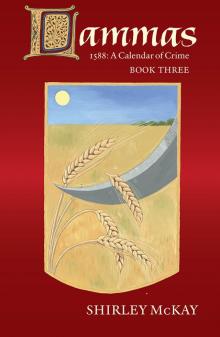 Lammas
Lammas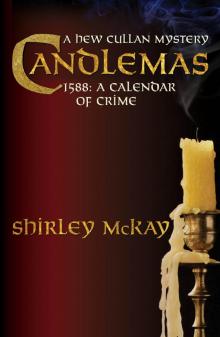 Candlemas
Candlemas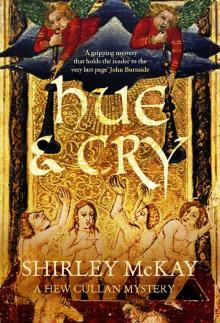 Hue and Cry
Hue and Cry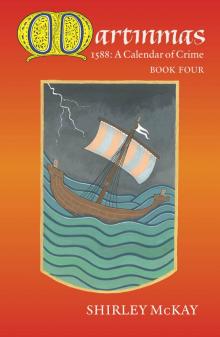 Martinmas
Martinmas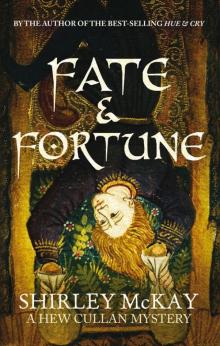 Fate and Fortune
Fate and Fortune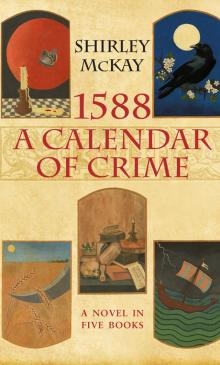 1588 A Calendar of Crime
1588 A Calendar of Crime Time and Tide
Time and Tide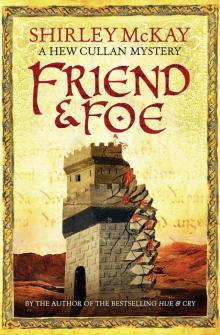 Friend & Foe
Friend & Foe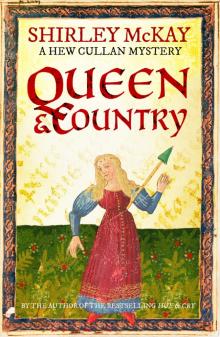 Queen & Country
Queen & Country